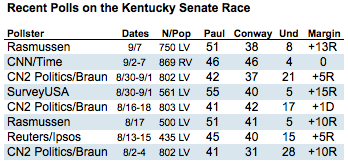
Two new polls released yesterday on the Kentucky Senate race by CNN/Time and Rasmussen Reports help illustrate two intriguing patterns we are watching this year: Bigger than usual differences between polls sampling only registered voters rather than likely voters and consistent gaps between polls that use live interviewers versus automated methods.
The new CNN/Time polls released for Kentucky, Florida and California yesterday reported results for all self-described registered voters, while other recent polls have started to narrow their samples to those most likely to vote in this year's midterm elections. The split represents a divergence in philosophy among pollsters: Some have less faith in the ability of polls to identify the likely electorate before October, while others apply simple likely voter "screens" a year or more before the election.
This year, national results reported by the Pew Research Center and Gallup have shown bigger than usual gaps between Republicans and Democrats on enthusiasm and, especially, interest paid to the campaign (many pollsters use the latter measure as part of an index used to select likely voters). Moreover, two new national polls this week by ABC News/Washington Post and the NBC/Wall Street Journal showed Republicans running much better among likely voters on the generic U.S. House ballot.
The "likely voters" identified by pollsters are typically a few points more Republican, as turnout is typically higher among Republican-leaning demographic groups -- those who are older, better educated and white. But, again, this year's gap -- at least in early national surveys -- appears to bigger than usual.
We are also seeing another pattern emerge that is mostly unique to 2010: In several states, pollsters using automated methods, particularly Rasmussen Reports, SurveyUSA and Public Policy Polling (PPP), are reporting results consistently more favorable to Republican candidates than those using live interviewers.
Until recently, the two differences were confounding and hard to disentangle, as the automated polls were usually the only ones that also screened for likely voters. But as more pollsters are now shifting to likely voter screens, we are beginning to see the differences that are more clearly about the survey "mode."
The Kentucky Senate race is a prime example. Yesterday's CNN/Time live interviewer survey of registered voters shows a dead-heat tie (46% to 46%) between Republican Rand Paul and Democrat Jack Conway. Yet surveys of likely voters conducted in August by Rasmussen and SurveyUSA have shown Paul leading by larger margins (roughly 10 points on average), with the surveys of likely voters conducted with live interviewers by CN2 Politics/Braun Research and Reuters/IPSOS fall somewhere in between (Paul leading by 5 point on average).

We do not see these patterns everywhere. For example, CNN and Time also released new surveys yesterday on the races for Senate and Governor in California and Florida which were generally more consistent with other recent surveys that used automated methods or likely voter screens.
But we are seeing the Kentucky pattern elsewhere and will certainly have more to say about it over the next nine weeks. Today, however, we offer this advice: Remember New Jersey.
Another highlight from yesterday's polls:
Although CNN/Time survey on the Florida Senate race shows Democrat Kendrick Meek running a distant third, his 24% of the vote is the most he has received since Charlie Crist announced his intention to run as an independent.
Yes, the registered voter screen used for the survey may produce a slightly more Democratic sample, but the results among Democrats explain much of the difference: Meek leads Crist in that subgroup on the CNN/Time poll (54% to 36%). When I averaged Meeks's standing among Democrats in polls conducted before the August primary, Crist actually ran slightly ahead among Democrats (43% to 37%).
Coming up tomorrow morning: A look at the races for governor.
